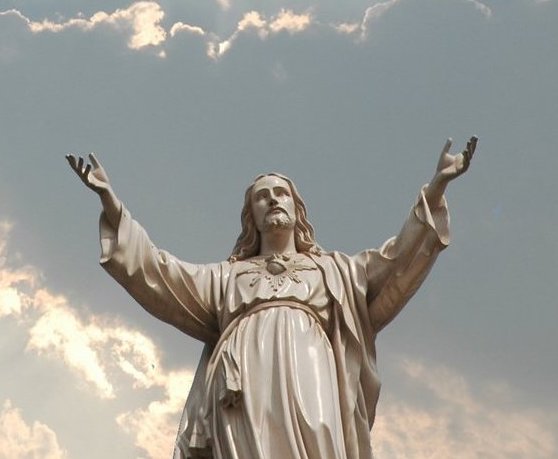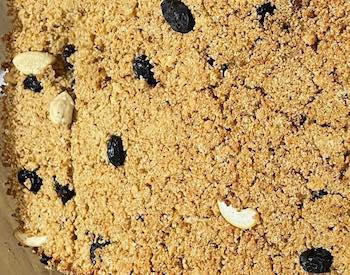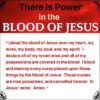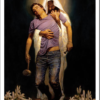“Believe me that I am in the Father and the Father is in me; but if you do not, then believe me because of the works themselves” (John 14:1)
What was it in the works of Jesus that He wanted his disciples to see, so that they would understand that He was indeed the Son of God? As I pondered on this scripture, I decided to take a deeper look at the works of Jesus as revealed in the Gospels and Epistles. The more I studied, the clearer became the meaning of this scripture. Jesus was indeed doing the same works that the Father had done for the Israelites in the Old Testament times, and for us now. With every word and deed, Jesus was revealing the Father’s loving heart once again. And His works clearly did reveal that the Father and He were one.
Let us take a look:
1) Jehovah Rapha: The God Who Heals (Exodus 15:26)
God first revealed himself as ‘Jehovah Rapha’ to the Israelites in the Desert of Shur. After crossing the Red Sea, the Israelites entered this desert and walked for three days without finding any water. They finally came to the River Marah, but found the waters too bitter to drink. The Lord then instructed Moses to throw a piece of wood in it, after which the water became sweet and potable. Through this miracle, God declared himself to be Jehovah Rapha- “I am the Lord who heals you.”
As we read the Gospels and see the works that Jesus did, we see that he was indeed ‘Jehovah Rapha’. He healed the ones who were sick of body by removing their physical ailments( John 4:46-47), the sick of the mind by casting out demons (Mark 5:1-20) and the sick of the spirit by forgiveness of sins ( Mark 2:5-12).
2) Jehovah Shalom: God is Peace (Judges 6:24)
When the Lord commissioned Gideon to set the Israelites free from oppression of the Midionites, He revealed Himself as the God of peace. The Lord encouraged Gideon by saying “Peace be with you. Do not fear, you shall not die.” Gideon built an alter there to the Lord and called it ‘Jehovah Shalom’ as a reminder of the Lord’s promise of peace.
Jesus said these very words to His disciples when he said “Peace I leave with you, my peace I give to you. Do not let your hearts be troubled, and do not let them be afraid.” (John 14:27). Jesus brings His peace to every situation, whether by calming the waters of the sea or the turbulence of our minds. “Peace, be still.” (Mark 4:31)
3) Jehovah Jireh: God Will Provide (Genesis 22:14)
God revealed Himself as ‘Jehovah Jireh’ to Abraham at Moriah when He commanded him to sacrifice his only son Isaac as a burnt offering. But God, who had tested Abraham’s heart, and found it faithful, provided a substitute in the form of a ram. So Abraham called that place ‘The Lord Will Provide’.
Jesus showed this facet of His Father as Jehovah Jireh when He provided for the multitudes by the multiplication of loaves and fish (Matthew 14:15-21, Matthew 15:32-38). Jesus also declared, “I am the bread of life. Whoever comes to me will never go hungry and whoever believes in me will never be thirsty (John 6:35).
4) El Roi: The God Who Sees Me (Genesis 16:13-14)
The story of Hagar is a poignant one. Sarai offers her maid Hagar to Abraham when she is unable to conceive a child. After Hagar conceives, Sarai becomes jealous, and deals so harshly with her that Hagar runs away into the wilderness. In the midst of her despair, the angel of the Lord finds her and comforts her. So Hagar declares the Lord as ‘El Roi’ because He saw her plight when no one else did.
Like His Father, we see Jesus too is the God Who Sees, when He provides solace to many people whom no one else gave a second thought to. He saw the man at the pool of Bethesda, who had been lying paralysed for 38 years with no one to help him, and healed him ( John 5:1-16). Jesus saw the despair of the widow at Nain, who was going to bury her only son, and raised him up and restored him to her (Luke 7:11-17). He saw the heart of Zacchaeus, who had climbed up a tree to catch a glimpse of Jesus and forever changed his life with grace by calling him by his name and going to his house to stay(Luke 19:1-10). Nathaniel believed Jesus to be the son of God and became a follower when he realised that Jesus had seen him under the fig tree before Philip called him. (John 1:43-51).
5) Immanuel: God with us (Isaiah 7:14, Mathew 1:23)
Throughout the old Testament, we see God constantly reassuring His people that He is always with them. He speaks to the Israelites through Moses just before Moses is to die, saying “It is the Lord your God who goes with you, He will not fail you or forsake you. Do not fear or be dismayed”( Deut 31:6-8). In the book of Joshua, we see God reassuring Joshua again with these words – “Be strong and courageous. Do not be frightened or dismayed, for your Lord your God is with you wherever you go” (Joshua 1:9).
The name “Immanuel” appears in Isaiah 7:14, as a sign from God to king Ahaz, and is interpreted in the Gospel of Mathew as the prophecy of the birth of Jesus, the promised Messiah. In the gospels we see that Jesus fulfilled this prophecy and was indeed a God who is with His people. He is with the sick providing healing, with the hungry providing food, with the sinners providing forgiveness and reconciliation. He is still with us today in the abiding presence of the Holy Spirit.
6) Jehovah Rohi: The Lord Is My Shepherd (Psalm 23)
David, a shepherd himself, comes upon the realisation that God shepherds him from all harm and provides for him just like a good shepherd provides for his sheep. In an outpouring of gratitude at this realisation, comes forth the beautiful Psalm 23 where David declares “The Lord is my shepherd, I shall not want”.
Our Lord Jesus revealed himself as the Good Shepherd in John 10: 1-17. He said, “The good shepherd lays down His life for His sheep”, and true to His word, Jesus laid down His most precious life for us upon the cross, so that we could be redeemed and have eternal life.
7) Jehovah Tsidkenu: The Lord our Righteousness (Jeremiah 23:6, 33:16)
In the book of Jeremiah, God promises a righteous branch (Jesus), who will bring restoration to Israel through the lineage of David. “This is the name by which he will be called: ”The Lord is our righteousness”
Jesus came and died for us on the cross, bearing our all sins, so that we can become righteous before God and have eternal life. “For our sake He made Him to be sin who knew know sin, so that in Him we might become the righteousness of God” (2 Corinthians 5:21)
8) Jehovah Mekoddishkem: The Lord Who Sanctifies You (Exodus 31:12-13)
“The Lord said to Moses, You yourself are to speak to the Israelites, saying, you shall keep my Sabbaths, for this is a sign between me and you throughout your generations, given in order that you may know that I am the Lord who sanctifies you”
Sanctification is separation from sin, a separation unto holiness, unto God. Jesus took our sin nature and crucified it along with Him on the cross, so that we can be a people set apart to God. “And it is by God’s will that we have been sanctified through the offering of the body of Jesus Christ once for all”(Hebrews 10:10)
9) Jehovah Nissi: The Lord Our Banner (Exodus 17:15)
We see in the book of Exodus that as long as Moses held his hands up, the Israelites prevailed in their fierce battle against the Amalekkites. After they won the battle, Moses built an alter to the Lord in commemoration, and called it “The Lord is my Banner”
Today, we the disciples of Jesus Christ are proudly known by His banner: we are called Christians. Catholics, Methodists, Baptists, Orthodox – all untied under this banner of Christ. ”For there is neither Jew nor Gentile, neither slave nor free, nor is there male or female, for you are all one in Christ Jesus”(Galatians 3:28)
By Annie Joe P
Christ & Co.













